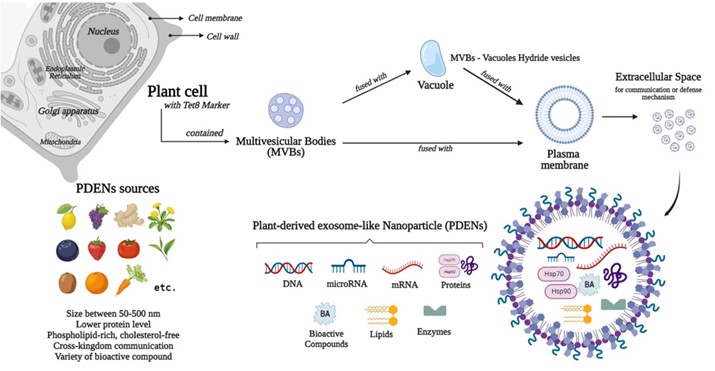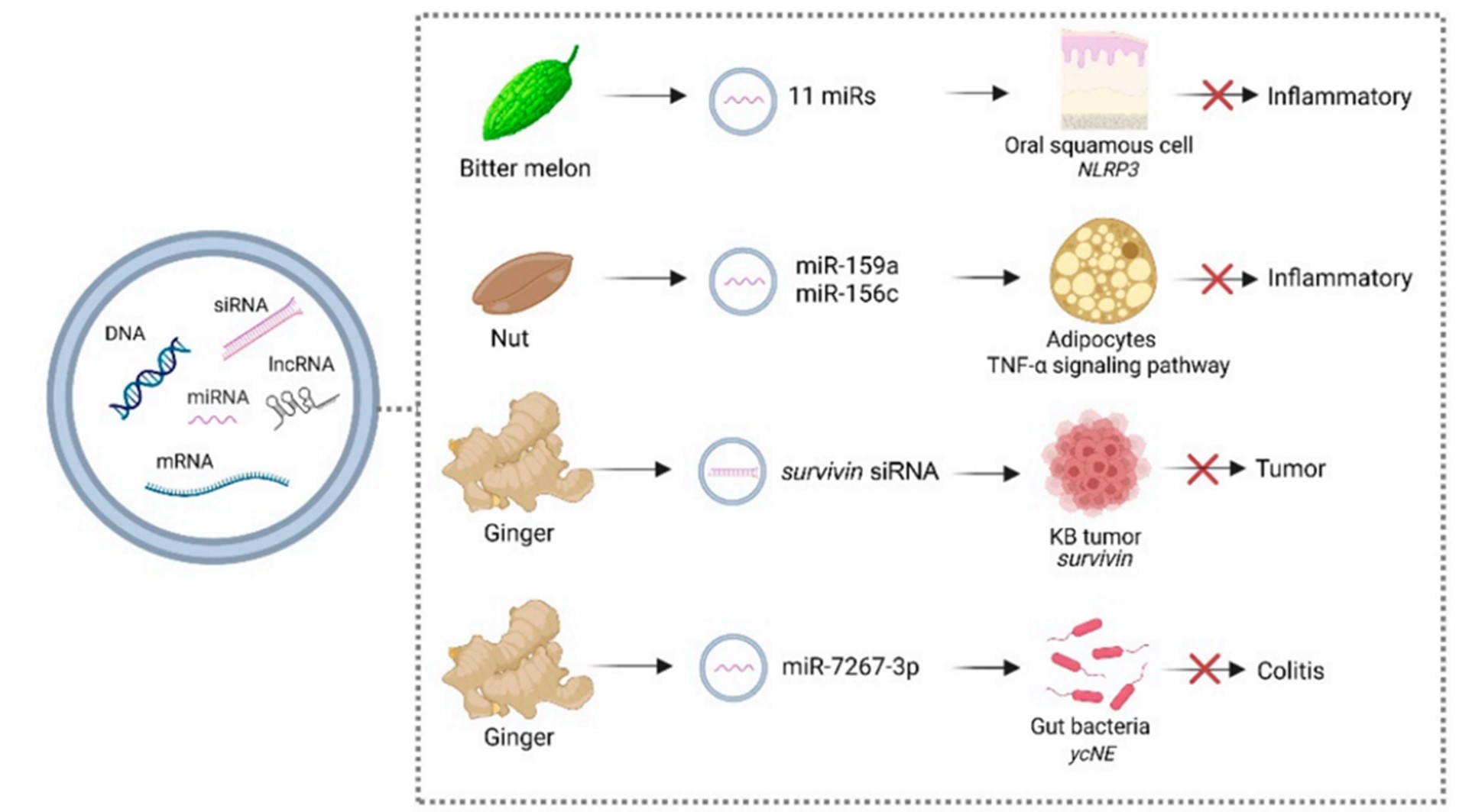Plant-derived Exosome Research and Applications
Overview Services Workflow Platform Applications Advantages Deliverables Review FAQ
Overview
Plant-derived extracellular vesicles, particularly exosomes, represent a rapidly evolving frontier in biotechnology and functional biology research. These naturally occurring nanocarriers facilitate intercellular communication within plant systems and hold remarkable potential for cross-kingdom delivery of bioactive molecules. Creative Biolabs is proud to be at the forefront of this emerging field, offering comprehensive research support for plant exosome exploration and application.
The study of plant exosomes offers insight into how plants regulate growth, respond to environmental stressors, and protect against pathogens. By deciphering their roles in signaling and molecular transport, Creative Biolabs enables the development of innovative solutions for agriculture, materials science, and skincare research.
 Fig.1 Sources, biogenesis, and contents of plant-derived exosome-like nanoparticles (PDENs).1
Fig.1 Sources, biogenesis, and contents of plant-derived exosome-like nanoparticles (PDENs).1
Our Services
At Creative Biolabs, we offer a complete suite of services tailored to plant-derived exosome research:
-
Exosome Isolation: Efficient purification of vesicles from a wide range of plant tissues using ultracentrifugation, SEC, or kit-based methods.
-
Characterization: Size profiling, protein content analysis, zeta potential measurement, and imaging by TEM or NTA.
-
Molecular Profiling: Proteomics, lipidomics, metabolomics, and small RNA sequencing to decode exosomal cargo.
-
Functional Assays: Bioactivity testing of exosomes in mammalian cell lines and animal models.
-
Custom Research Projects: Tailored study designs and experimental execution for unique plant species or use cases.
-
Bioinformatics Support: Integrated data analysis pipelines to extract actionable biological insights.
Creative Biolabs ensures each project is supported by seasoned scientists and state-of-the-art infrastructure to deliver reliable and reproducible results.
Workflow
Our plant exosome research workflow is designed to be efficient and customizable:
-
Sample Preparation – Tissue selection and homogenization from fruits, flowers, roots, or leaves.
-
Isolation – Application of optimized protocols for vesicle enrichment.
-
Characterization – Structural, biochemical, and molecular profiling.
-
Functional Analysis – In vitro or in vivo testing to assess bioactivity.
-
Data Interpretation – Integration with advanced informatics to uncover mechanisms and applications.
-
Reporting & Consulting – Comprehensive data reports with expert interpretation and recommendations.
Platform
Creative Biolabs has developed a specialized platform dedicated to the study of plant exosomes, integrating high-resolution analytical tools, proprietary isolation techniques, and robust data processing pipelines. Our platform accommodates:
-
Diverse Plant Types: From crops and vegetables to medicinal and ornamental plants.
-
Multi-Omics Capability: Simultaneous analysis of proteins, lipids, RNAs, and metabolites.
-
Flexible Scale: Suitable for pilot projects, scale-up studies, or commercial R&D.
Our facility ensures that the following various plant-derived vesicles are handled under the highest standards for purity, functionality, and consistency.
|
Types
|
Source examples
|
Research examples
|
|
Fruit-derived Exosome
|
Lemon, Strawberry, Grape, Coconut, etc.
|
Grape-derived vesicles have shown the ability to support intestinal health by encouraging epithelial regeneration and promoting stem cell activity under stress conditions.
|
|
Flower-derived Exosome
|
Aloe vera, rose, tea, tea tree flower, etc.
|
Exosomes from tea tree flowers have been observed to modulate cell cycle activity and oxidative stress responses in certain cell models.
|
|
Medicinal Plant-derived Exosome
|
Ginseng, Asparagus cochinchinensis, mulberry bark, Phellinus linteus, etc.
|
These exosomes are often enriched with native small molecules from their source plants and may serve as promising carriers for bioactive compounds in functional studies. For example, Rhodiola rosea-derived exosomes carrying HJT-sRNA-m7 have shown bioactivity in fibrosis-related pathways.
|
|
Vegetable-derived Exosome
|
Carrots, tomatoes, shiitake mushrooms, onions, etc.
|
Vesicles from shiitake mushrooms have demonstrated regulatory effects on inflammatory pathways through modulation of specific signaling components.
|
|
Cereal-derived Exosome
|
Wheat, oats, buckwheat, corn, etc.
|
Wheat-derived vesicles have been noted to enhance cell proliferation and migration in epithelial and dermal cell types, supporting their utility in regenerative research.
|
 Fig.2 Application of plant-derived exosomes in animal disease biotherapy.2
Fig.2 Application of plant-derived exosomes in animal disease biotherapy.2
Applications
Research has highlighted the multifaceted roles of plant-derived exosomes in:
-
Host-Pathogen Interaction: For instance, sunflower-derived vesicles have been shown to inhibit fungal development and morphology, implicating their defensive function.
-
Immune Signaling: Arabidopsis exosomes transport non-coding RNAs to pathogens like Botrytis cinerea, modulating their gene expression and reducing virulence.
-
Stress Resistance: Lipid-rich vesicles from Arabidopsis leaves play a crucial part in biotic stress response by interacting with fungal pathogens.
-
Cell Wall Modification: Exosomes in spruce were found transporting enzymes involved in cellulose processing, affecting secondary growth.
-
Functional Delivery: Exosomes from Rhodiola rosea exhibit potential in modulating fibrosis-associated molecular pathways, while ginseng-derived vesicles have enhanced the delivery of co-loaded functional molecules in vitro.
Creative Biolabs helps clients explore and validate these applications in agriculture, personal care, and fundamental bioscience.
Advantages of Choosing Creative Biolabs
-
Diverse Sample Expertise: From fruits like grapes and lemons to medicinal roots and cereal crops.
-
Integrated Solutions: One-stop platform from isolation to bioinformatics.
-
Custom Project Design: Tailored services for novel or underexplored plant species.
-
Collaborative Approach: Client-focused project planning and transparent reporting.
-
Proven Track Record: Years of hands-on experience and successful project deliveries in exosome research.
Deliverables
Each project at Creative Biolabs results in:
-
Detailed methodology documentation
-
Quality-controlled vesicle samples (where applicable)
-
Comprehensive data reports (size, protein content, RNA profiles, etc.)
-
Biological activity results (if functional studies are performed)
-
Bioinformatics summaries with pathway and interaction analysis
-
Expert consultation for follow-up studies or publication preparation
Customer Review
"Partnering with Creative Biolabs for our plant exosome study was a game-changer. Their expertise in both wet lab and data analysis helped us discover novel bioactive RNAs in ginseng-derived vesicles. The team was responsive, knowledgeable, and truly collaborative throughout our project."
— Dr. EmiXXX, Senior Scientist
Whether you're developing plant-based therapies, studying inter-kingdom communication, or testing new skincare innovations, Creative Biolabs is your trusted partner. Our integrated exosome research solutions are designed to unlock the full potential of plant vesicles. Contact us today to learn more or request a quote.
FAQ
Q: What methods does Creative Biolabs use for isolating plant exosomes?
A: We use a combination of ultracentrifugation, filtration, and SEC, adapted for the unique properties of different plant matrices to maximize yield and purity.
Q: Can Creative Biolabs help with the analysis of exosomal RNA or proteins?
A: Absolutely. Our platform offers deep RNA sequencing, proteomics, and customized analysis pipelines to characterize exosomal cargo thoroughly.
Q: Are your services suitable for skincare and cosmetic research?
A: Yes. Many of our clients explore the use of plant exosomes in topical applications. We offer assays to evaluate antioxidant capacity, skin penetration, and regenerative potential.
Q: What if I'm working with a rare or non-model plant species?
A: Creative Biolabs excels in customized research. Our scientists can develop optimized protocols for novel species and provide recommendations based on preliminary data.
Q: Can Creative Biolabs provide vesicle samples for pilot-scale studies?
A: Yes. We offer scalable processing for plant exosome isolation and can provide vesicle samples in quantities suitable for feasibility, formulation, or in vitro testing studies.
Q: Does Creative Biolabs offer support for downstream molecular assays using plant vesicles?
A: Certainly. We can assist with RNA extraction, small RNA sequencing, lipid analysis, and targeted assays based on your research goals, all optimized for exosomal material.
References
-
Sarasati, Andari, et al. "Plant-Derived Exosome-like Nanoparticles for Biomedical Applications and Regenerative Therapy." Biomedicines 11.4 (2023): 1053. Distributed under Open Access license CC BY 4.0, without modification.
-
Chen, Yu-Xin, and Qiang Cai. "Plant exosome-like nanovesicles and their role in the innovative delivery of RNA therapeutics." Biomedicines 11.7 (2023): 1806. Distributed under Open Access license CC BY 4.0. The image was modified by extracting and using only Part A of the original image and revising the title.
For Research Use Only. Cannot be used by patients.
Related Services:

 Fig.1 Sources, biogenesis, and contents of plant-derived exosome-like nanoparticles (PDENs).1
Fig.1 Sources, biogenesis, and contents of plant-derived exosome-like nanoparticles (PDENs).1
 Fig.2 Application of plant-derived exosomes in animal disease biotherapy.2
Fig.2 Application of plant-derived exosomes in animal disease biotherapy.2









